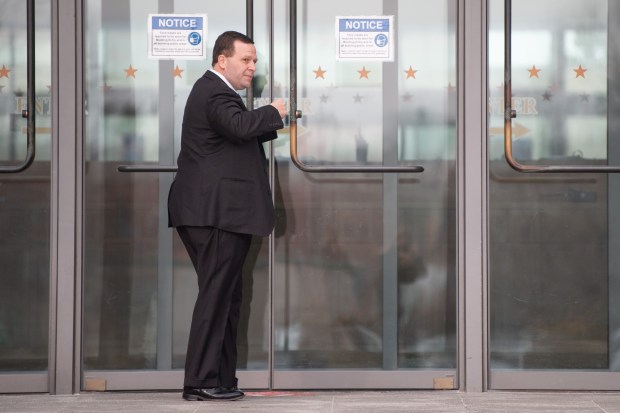Former Portage Mayor James Snyder and federal prosecutors agree on one point — in light of the U.S. Supreme Court overturning his bribery conviction involving the purchase of garbage trucks, his case should be remanded back to U.S. District Court in Hammond, where a jury convicted him during two separate trials.
From there, not surprisingly, the two sides diverge. Per his filing, Snyder rejects the government’s argument that he could have been convicted of either bribery or soliciting a gratuity and said there’s no legal basis for a retrial without a re-indictment. Federal prosecutors argue a new trial is the next step since a jury already convicted him.
Both sides filed their case Friday before the U.S. Court of Appeals for the 7th Circuit in Chicago.
After multiple twists, turns and delays since Snyder was indicted on Nov. 17, 2016, in district court on two bribery counts and one for obstructing the IRS, a jury found Snyder not guilty on a bribery count involving a towing contract and guilty on the other two counts.
The second bribery conviction, over allegations surrounding a $13,000 payment involving around $1 million in contracts for garbage trucks, stood after two trials, only to get overturned when a majority of the Supreme Court determined that the payment was a gratuity, not a bribe, and criminalizing the payment put even routine campaign contributions at the risk of the federal government’s wrath.
Overturning Snyder’s conviction had a ripple effect on countless other cases, most notably prominent cases in Illinois, including the trial of ex-House Speaker Michael Madigan and the case of the “ComEd Four” who were convicted of a scheme to bribe him.
The Supreme Court decision, released on June 26, determined, among other matters, that the payment to Snyder from the Buha brothers, owners of Great Lakes Peterbilt, was a gratuity because Snyder received the money, reportedly for consulting work, after the business got the garbage truck contracts and not before.
Snyder’s attorneys argue it’s too late to re-indict Snyder.
“Since the statute of limitations has run, re-indictment at this late date is no longer possible and other only appropriate response to the Supreme Court’s decision is to remand the case to the District Court for dismissal of the charge against him,” the filing states.
Federal prosecutors disagree and note in their filing that at trial, the government’s evidence proved beyond a reasonable doubt that Snyder accepted a bribe, the government made that argument to the jury and the jury convicted Snyder.
While the government also argued that Snyder was guilty of accepting a gratuity — the point upon which the Supreme Court chose to overturn his case, in distinguishing between a bribe and a gratuity — moving forward with a new trial “is the just result,” the government argued, and Snyder’s “arguments to the contrary are entirely without merit.”
“It is a bedrock principle of federal criminal law that, where the government presents sufficient evidence to prove a charged offense, a successful appeal on any other ground poses no bar to further prosecution of that same charge on remand,” federal attorneys wrote.
Snyder’s attorneys, meanwhile, argue that the Supreme Court’s 6-3 decision to overturn his conviction for accepting $13,000 for “consulting work” after the city accepted bids for garbage trucks from Great Lakes Peterbilt “did not leave open the possibility that Mr. Snyder was charged with or could have been convicted of having accepted a bribe.”
Snyder, according to the filing by his attorneys, does not agree that the Supreme Court’s decision left open any possibility of a retrial that would allow the government “a third ‘bite at the apple.’”
“This was not the case of instructional error, but error in the charge itself,” the filing notes.
Additionally, Snyder’s attorneys argue that he has been twice prosecuted and convicted “under a law now found to be inapplicable to the conduct alleged.”
Federal prosecutors describe Snyder in their filing as “a thoroughly corrupt public official, twice convicted by a jury of his peers for receiving a $13,000 payoff,” and note there is “no sound legal basis” for a windfall dismissal because of an omission from jury instructions.
Snyder, a Republican, was first elected mayor in 2011 and reelected in 2015, a term cut short by his federal conviction in February 2019.
Snyder received a sentence of 21 months in prison for the bribery and IRS convictions and a year on supervised release from U.S. District Court Judge Matthew Kennelly.
Snyder successfully argued that the start of his sentence should be postponed until his bid to have the Supreme Court hear his case was complete.
Regardless of the outcome of Snyder’s request before the appellate court, his sentence will remain in flux until the case reaches its conclusion.
alavalley@chicagotribune.com



